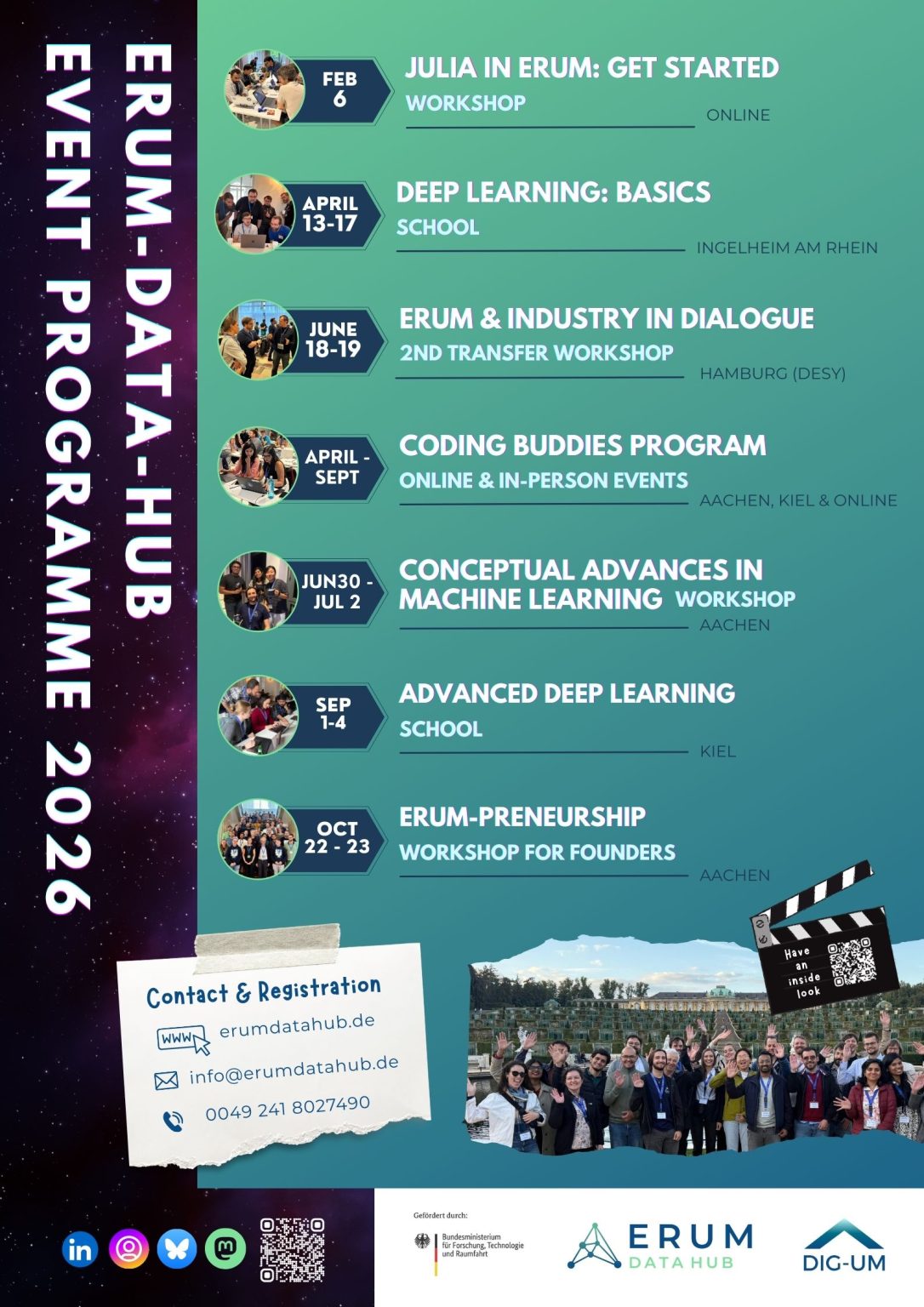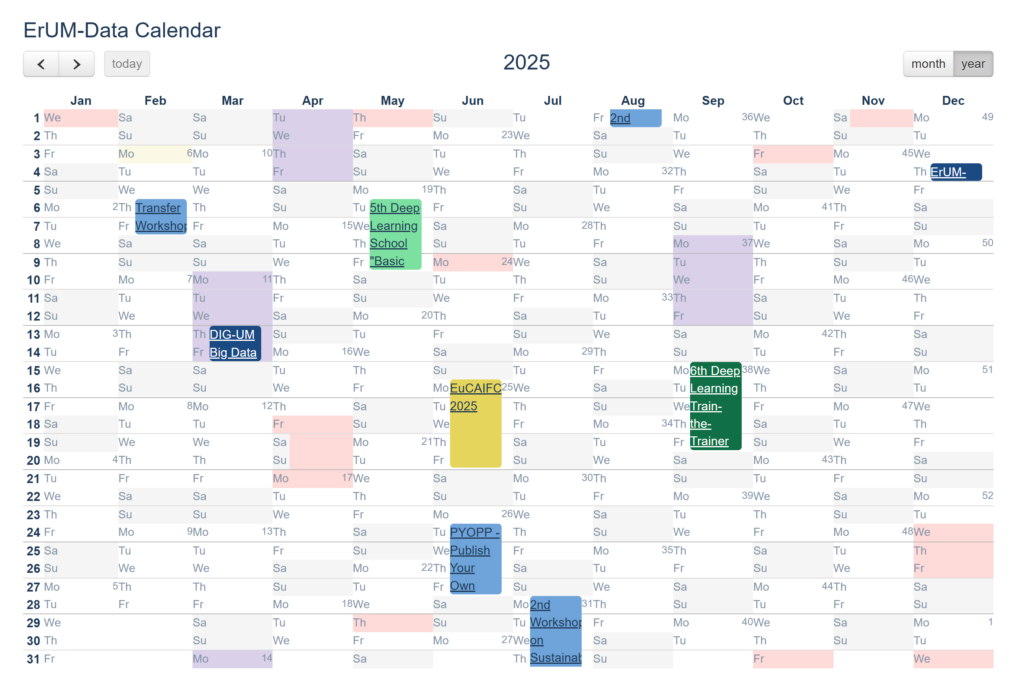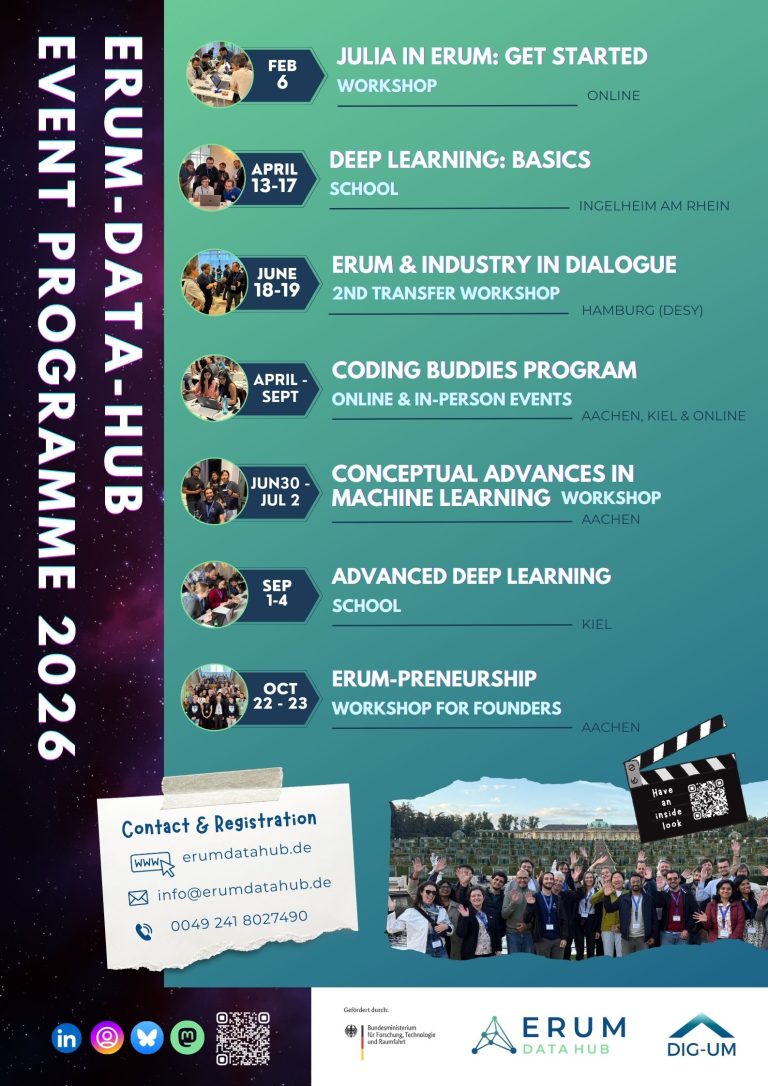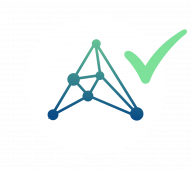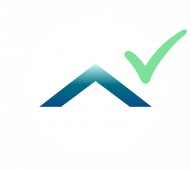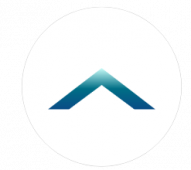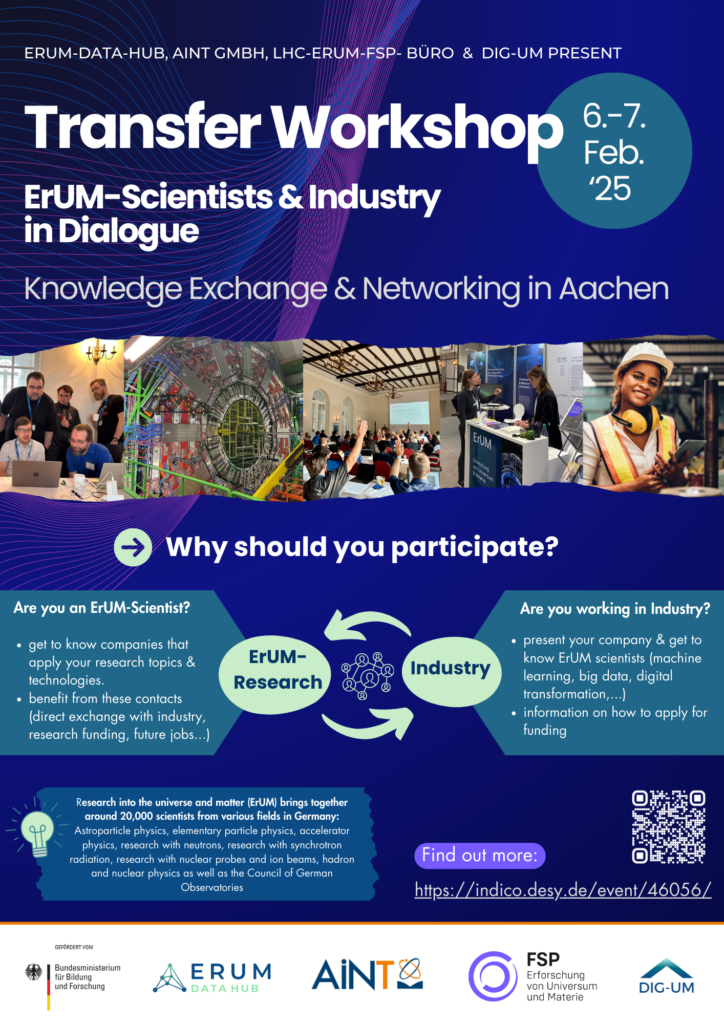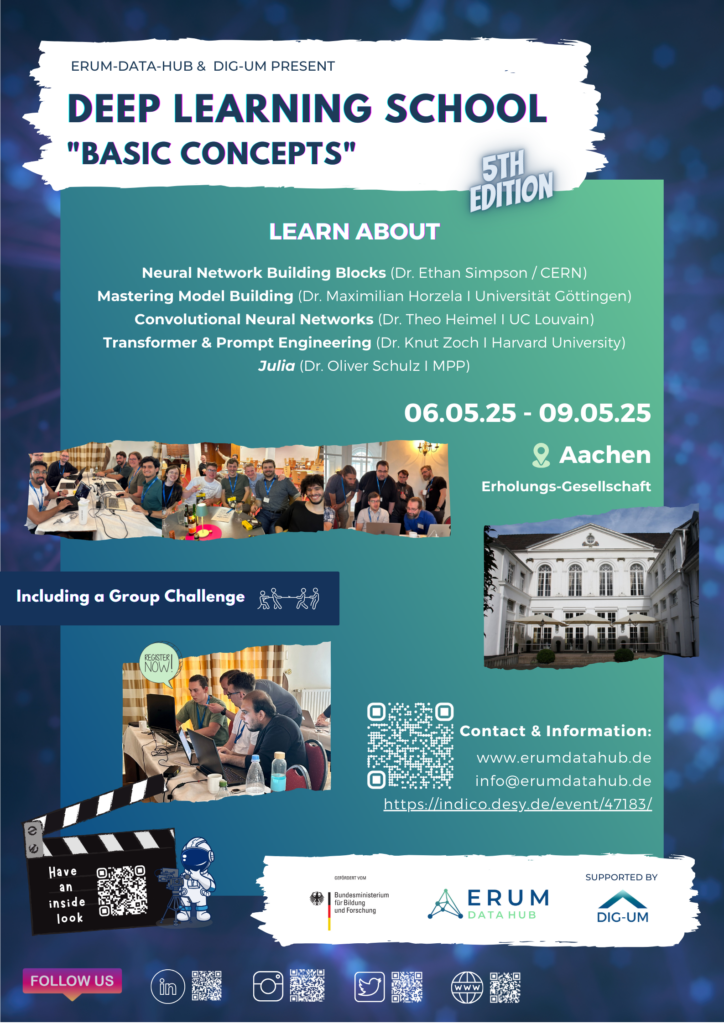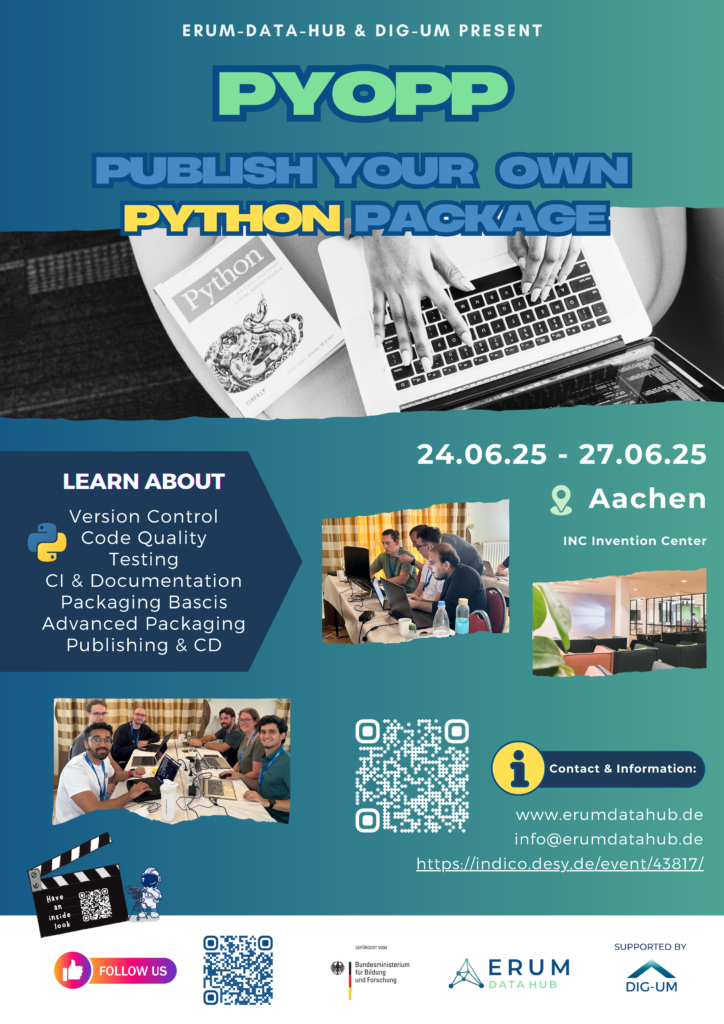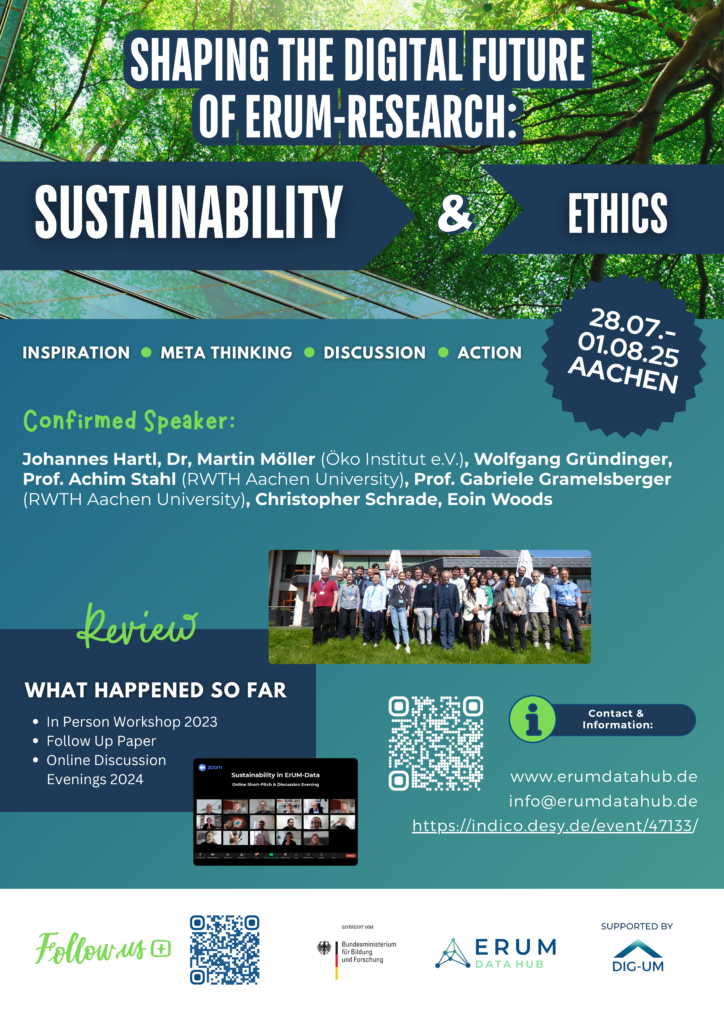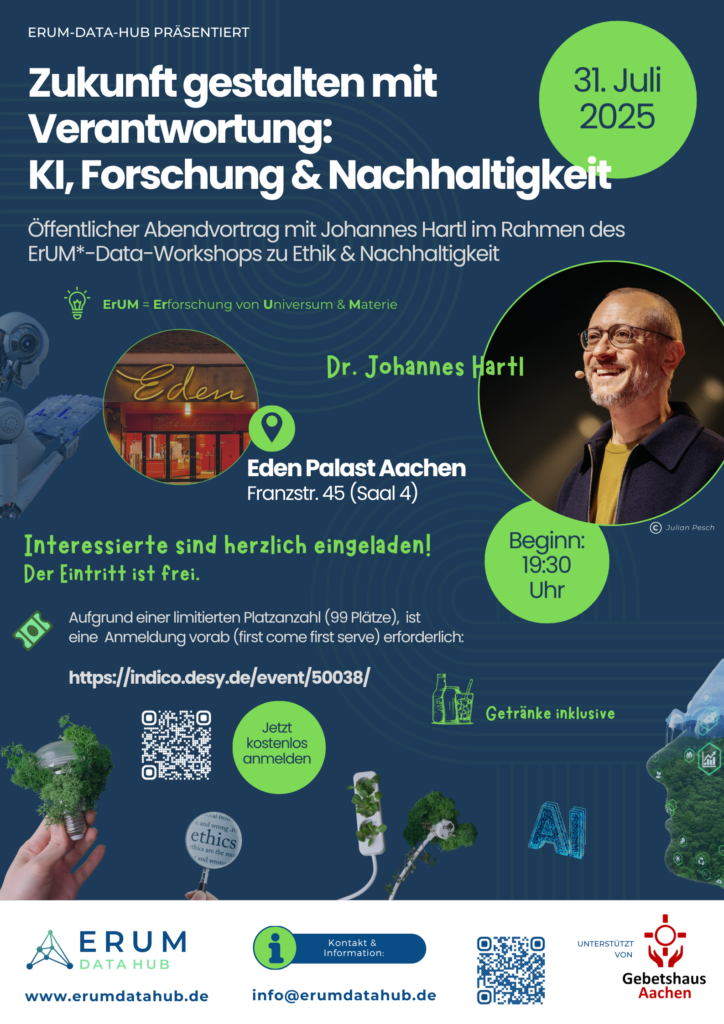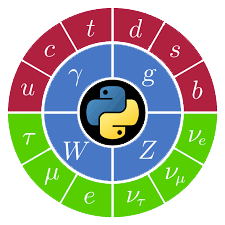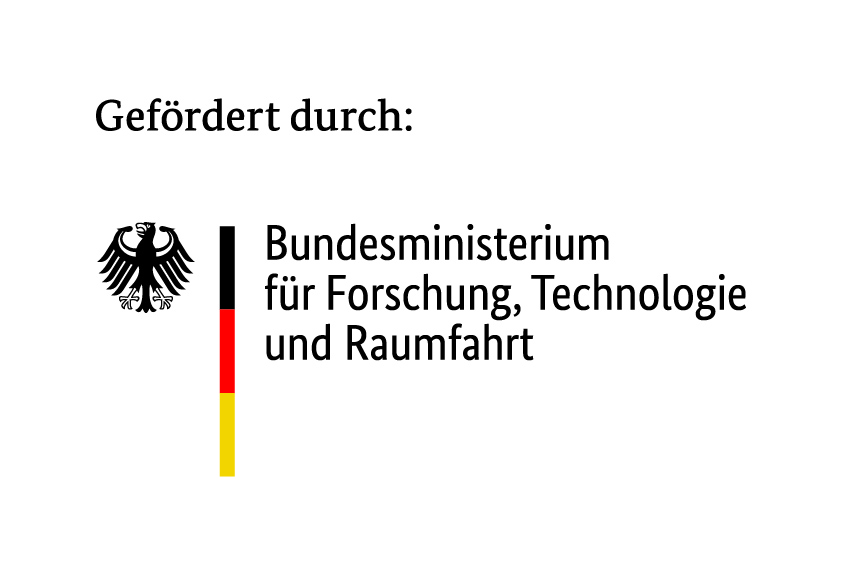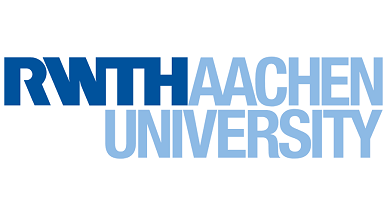Veranstaltungen
Veranstaltungen
Event-Programm 2026
Auch im Jahr 2026 veranstaltet der ErUM-Data-Hub in Zusammenarbeit mit DIG-UM spannende Workshops, Schools und Trainings-Programme. Die Veranstaltungen richten sich an Teilnehmer:innen aus allen ErUM-Communities und werden an unterschiedlichen Standorten in Deutschland gehalten.
Alle Events findet ihr auf Indico.
Upcoming Events 2026
Hamburg, DESY
18.06. - 19.06.26
The Program consists of 2 in-person events and 3 online meetings in between.
The opening event will take place from May 6 - 8 in Aachen. The closing event will take place from September 8 - 10 in Kiel.
The goal of the program is to provide you with everything you need to improve your code.
You will attend lectures led by experts from the coding community and have time to work on your own code with expert support.
April - September 2026
Past Events
Past Events
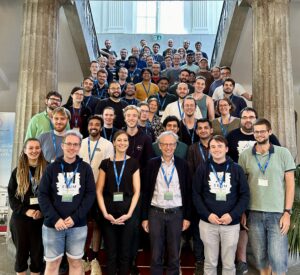
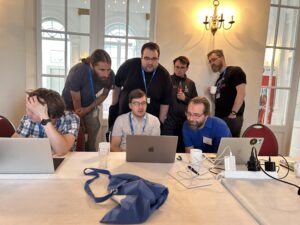
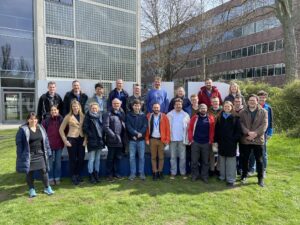
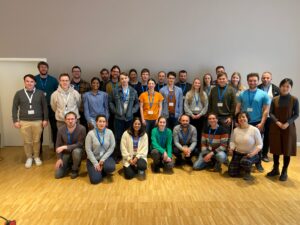
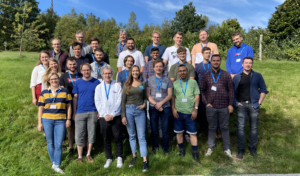
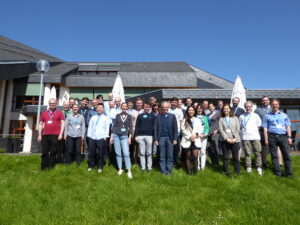
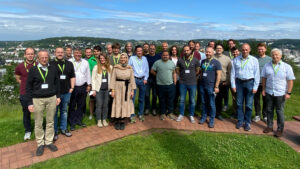
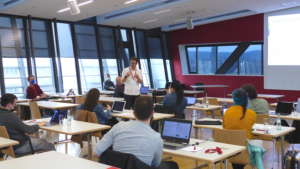
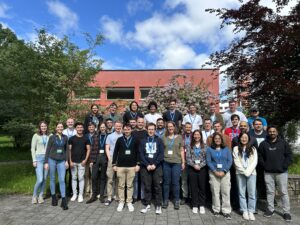
Workshops & Schools 2025
Aachen
28.07. - 01.08.25
Past Events 2025
This is an event organized by the ErUM-Data-Hub, AiNT GmbH and LHC-ErUM-FSP-Büro, with support from DIG-UM.
This workshop aims to support the transfer of the resulting knowledge from ErUM-research to industry by networking scientists and companies. The long term goal is to carry out joint projects, to identify synergies and provide job opportunities.
Why should you participate?
- ErUM scientist: Get to know companies that apply your research topics and technologies. You will benefit from these
contacts through direct exchange with industry, application for research funding in potential joint projects or for future jobs. - Industry: This is your opportunity to present your company and get to know ErUM scientists (machine learning, big data,
digital transformation, future technologies, …). You will also receive information on how to apply for funding for joint projects via ErUM Calls.
This is the annual Big Data Analytics Topic Group meeting organized by DIG-UM with support from the ErUM-Data-Hub. The aim of this meeting is for all members of the BDA Topic Group, and escpecially participants from the Projects in the Verbundforschung Software&Algorithmen of ErUM-Data, to meet up, discuss recent results, new ideas and possible future efforts.
This is an event organized by the ErUM-Data-Hub with support from DIG-UM.
In May 2025, we will host for the fifth time the Deep Learning School at Erholungsgesellschaft, Aachen. In a comfortable ambience, intensive classes on Neural Network Building Blocks, Mastering Model Building, Convolutional Neural Networks and Transformer will be held over 4 days.
The workshop is aimed at deep-learning starters from all ErUM communities (Research on Universe and Matter) who have a basic knowledge of physics.
This is an event organized by the ErUM-Data-Hub with support from DIG-UM.
In this workshop you will learn all steps to package, publish, document, and test your python package. For this, you are encouraged to bring your own software package.
This workshop is intended for researcher from all academic levels who are interested in getting their python software into the community.
The workshop will comprise keynote blocks (see timetable) and hands-on sessions accompanied by experts. By the end of this workshop you will (be able to) publish your own python software package. The timetable includes time to work on your own package publishing. You will be supported by a team of tutors.
This is an event organized by the ErUM-Data-Hub with support from DIG-UM.
DIG-UM, the ErUM-Data-Hub and the Program Committee cordially invite you to the second workshop addressing sustainability & ethics in the digital transformation in ErUM-Data.
This creative workshop aims to discuss and develop strategic concepts
and concrete action for sustainability accompanied by ethical aspects in
the digital transformation of basic research on universe & matter
(ErUM).
Der ErUM-Data-Hub – mit freundlicher Unterstützung vom Gebetshaus Aachen – lädt Sie herzlich zum öffentlichen Abendvortrag Zukunft gestalten mit Verantwortung: KI, Forschung & Nachhaltigkeit mit Johannes Hartl im Eden Palast Aachen ein.
Wie verändert Künstliche Intelligenz die Forschung? Welche Verantwortung tragen Wissenschaft und Gesellschaft im Zeitalter der Daten? Ein inspirierender Impulsabend mit Johannes Hartl – über Ethik, Nachhaltigkeit und die Zukunft der Wissenschaft.
Der Vortrag findet ergänzend zu unserem Workshop Shaping the Digital Future of ErUM Research: Sustainability & Ethics statt.
This is an event organized by the ErUM-Data-Hub with support from DIG-UM.
The aim of this workshop is to provide future teachers and speakers with practical knowledge on how to teach deep learning while at the same time equipping them with the latest knowledge on deep learning methods. To this end, a dual program is offered in which the theory of deep learning methods and teaching methods are combined in practical hands-on sessions.
Past Events 2024
Basic Concepts
This was a ‚Generative Models‘ Workshop organized by the Big Data Analytics Topic Group of DIG-UM with support from the ErUM-Data-Hub. Aim of this workshop was to have a lively and open scientific exchange on new developments on generative models for ErUM research. This workshop was addressed to scientists from all ErUM communities who have been or are currently working on new generative models.
- 27.02.24 - 29.02.24
- Präsenzveranstaltung in Frankfurt
This was the annual Big Data Analytics Topic Group meeting organized by DIG-UM with support from the ErUM-Data-Hub. The aim of this meeting was for all members of the BDA Topic Group, and escpecially participants from the Projects in the Verbundforschung Software&Algorithmen of ErUM-Data, to meet up, discuss recent results, new ideas and possible future efforts.
- 29.02.24 - 01.03.24
- Präsenzveranstaltung in Frankfurt
- Zoom Link available
Following the success of the first workshop last year in Paris, we were glad to announce the 2nd International Particle Minibeam Therapy Workshop. There were experts from all related disciplines (physics, biology, clinics etc.) offering more stimulating and comprehensive discussions. In the workshop, plenty of people involved in the minibeam research community gave interesting talks, while also young researchers had the chance to present their work and gott beneficial feedback from experienced researchers.
- 20.03.24 - 22.03.24
- Präsenzveranstaltung in Neubiberg/München
This was the fifth Deep Learning Train-the-Trainer Workshop organized by the ErUM-Data-Hub with the support of DIG-UM.
Aim of this workshop was to educate lecturers for future teaching activities and to provide material to give lecture series on deep learning, including hands-on-exercises. Covered topics were Neural Network Building Blocks & Mastering Model Building, Convolutional Neural Networks & Graph Convolutions and Generative Models.
- 25.03 .- 26.03.24
- 30 Plätze
- Präsenzveranstaltung in Dresden
Active Training Course
The Active Training Course „Advanced Deep Learning“ took place over 4 days at Bernhäuser Forst in Filderstedt. The intensive course on Graph Neural Networks, Transformers, Normalizing Flows and Autoencoders included a challenge to be worked out and presented by participant subgroups.
- 21.05.24 - 24.05.24
- 45 Plätze
- Präsenzveranstaltung in Filderstadt
The aim of this event is to provide a networking opportunity for likeminded ErUM-Data scientists and the possibility to discuss similar proposal ideas for the upcoming ErUM-Data Call.
- 10.06.24
- 40 Plätze
- Präsenzveranstaltung in Aachen
The workshop is intended for researchers interested in sustainability within ErUM-Data.
Key ingredient to this workshop are short 1-slide pitches
from the participants introducing themselves/their work and current
projects/progresses or experience with sustainability. This session aims
to connect ErUM scientists and disseminate sustainability initiatives
and ideas.
- 17.06.24
- 30 Plätze
- Onlineveranstaltung (Zoom)
The workshop is supposed to bring together people who are interested in technical concepts that support the analysis of large ErUM datasets by individual researchers or small groups. Ideas how to shape an ErUM-Data project on and the development of federated infrastructures will be discussed.
- 18.06.-20.06.24
- Präsenzsveranstaltung in Garching
In this school you will learn how Python code can be accelerated. A focus will be placed on numeric NumPy-like array computations. In addition, running these array computations on hardware accelerators, i.e., GPUs, will play a key role in this school.
The school is intended for young researchers – especially for PhD students – who regularly work with the scientific Python ecosystem. Requirements are good knowledge of the scientific Python ecosystem, basics of the C++ programming language are beneficial.
- 19.08. - 22.08.24
- 45 Plätze
- Präsenzveranstaltung in Aachen
Developer’s Workshop PyHEP.dev 2024 will be a forum for the participants and the community to discuss developments of Python packages and tools, exchange experiences and inform the future evolution of community activities.
- 26.08. - 30.08.24
- 50 Plätze
- Präsenzveranstaltung in Aachen
Building on the insights and experiences from our previous workshop, this event addresses scientists from all ErUM communities. Our goal is formulate a common strategy on how to manage and maintain the access to data and workflows provided by the different stakeholders, ranging from large international collaborations to individual scientists. The common strategy will also discuss requirements with respect to infrastructure and research data management with a focus on the user facing components.
- 17.09. - 18.09.24
- 30 Plätze
- Präsenzveranstaltung in Dortmund
In this workshop we would like to bring together scientists who are planning to submit a proposal related to federated infrastructures or who participate already or would like to join such a proposal. In particular, we invite proposal consortia that have already formed or are in the process of forming to attend the workshop and coordinate their applications. We also explicitly invite individuals who are not yet part of such a consortium
- 04.11.2024
- Präsenzsveranstaltung in Aachen
This meeting aims to connect ErUM scientists and disseminate sustainability initiatives and ideas. Initial planning steps are also to be taken for an in-person meeting in 2025 (follow-up meeting for the 2023 workshop “Sustainability in the Digital Transformation of Basic Research on Universe & Matter“: https://indico.desy.de/event/37480/).
- 18.11.2024
- Online (via Zoom)
Dear Colleagues of the ErUM-Data Community: We invite researchers from all ErUM communities interested in progress of Digital Transformation to attend the DIG-UM Annual Meeting. The meeting will take place online and will include a BMBF
contribution, DIG-UM related reports, and the Spokesperson election.
Registrations is open.
- 03.12.2024
- Online (via Zoom)
Past Events 2023
Deep Learning Basics
Train-the-Trainer Workshop
Am 7. und 8. Februar 2023 veranstalten der ErUM-Data-Hub und DIG-UM erneut den Deep Learning Basics Train-the-Trainer Workshop. Veranstaltungsort im Jahr 2023 war München.
- 7.02.23 - 8.02.23
- Präsenzveranstaltung in München
Big Data Analytics
Connection Workshop
Am 23. und 24. Februar 2023 veranstalteten der ErUM-Data-Hub und DIG-UM einen Connection Workshop zum Thema Big Data Analytics auf dem DESY Campus in Hamburg. Ziel war es, Synergien zwischen den geförderten Projekten (und anderen Aktivitäten, wie den NFDI-Konsortien DAPHNE und PUNCH) zu finden und zu erörtern, wie Projekte, die in dieser Runde nicht gefördert wurden, dennoch realisiert werden können.
- 23.02.23 - 24.02.23
- Präsenzveranstaltung in Hamburg
Deep Learning School
Basic Concepts
Vom 27. Februar bis zum 2. März 2023 veranstalteten der ErUM-Data-Hub und DIG-UM zum zweiten Mal die Deep Learning Schule Basic Concepts.
Lesen Sie hier den Rückblick zu der ersten Deep Learning Schule im August 2022.
- 27.02.23 - 02.03.23
- 50 Plätze
- Präsenzveranstaltung in Meinerzhagen
Research Data Management
Expert Workshop
Im März 2023 veranstalteten der ErUM-Data-Hub und DIG-UM einen Expert Workshop zum Thema Research Data Management in Bonn.
- 13. - 14. März 2023
- Präsenzveranstaltung in Bonn
Next Generation Environment for Interoperable Data Analysis
Expert Workshop
Im März 2023 veranstalteten der ErUM-Data-Hub und DIG-UM einen Expert Workshop zum Thema Next Generation Environment for Interoperable Data Analysis in Berlin.
- 03. - 04. Mai 2023
- Präsenzveranstaltung in Berlin
Sustainability in the Digital Transformation of Basic Research on Universe & Matter
Expert Workshop
Vom 30. Mai bis zum 02. Juni 2023 veranstalteten der ErUM-Data-Hub und DIG-UM einen Experten Workshop zum Thema Sustainability in ErUM-Data.
- 30.05.23 - 02.06.23
- Präsenzveranstaltung in Meinerzhagen
Advanced Deep Learning
Train-the-Trainer
Am 19. und 20. Juni 2023 veranstalteten der ErUM-Data-Hub und DIG-UM den zweiten Advanced Deep Learning Train-the-Trainer Workshop.
- 19.06.23 - 20.06.23
- Präsenzveranstaltung in Dortmund
Basic Concepts
Vom 07. bis zum 10. August 2023 veranstalteten der ErUM-Data-Hub und DIG-UM erneut die Deep Learning Schule Basic Concepts.
- 07.08.23 - 10.08.23
- 50 Plätze
- Präsenzveranstaltung in Meinerzhagen
Active Training Course
Vom 25. bis zum 28. September 2023 veranstalteten der ErUM-Data-Hub und DIG-UM zum zweiten Mal die Advanced Deep Learning Schule in Meinerzhagen.
- 25.09.23 - 28.09.23
- 50 Plätze
- Präsenzveranstaltung in Meinerzhagen
This Workshop was hosted by the community organization DIG-UM with support from the BMBF-funded ErUM-Data-Hub.
The goal of the workshop was to get an overview on inverse problems in the ErUM-Data community, to discuss methods to solve them, and to foster exchange and cooperation between the ErUM-communities. In particular, the workshop was intended for early stage researchers.
- 05.12.23 - 06.12.23
- Präsenzveranstaltung in Garching
Past Events 2022
Deep Learning Basics
Train-the-Trainer Workshop
Am 30. und 31. März 2022 fand der erste ErUM-Data-Hub Workshop in Aachen statt. Der Deep Learning Train-the-Trainer Workshop beinhaltete 4 Vorträge zu den Themen Deep Learning Basics, Convolutional Neural Networks, Recurrent Neural Networks und Introspection Neural Networks und verfolgte das Ziel, Dozent:innen für zukünftige Lehrtätigkeiten auszubilden und Material für Vorlesungen zum Thema Deep Learning bereitzustellen.
- Deep Learning Basics
- Recurrent Neural Networks
- Convolutional Neural Networks
- Introspection Neural Networks
Deep Learning Workshop
Train-the-Trainer 2
Advanced Concepts
Vom 09.06.2022 bis 10.06.2022 haben der ErUM-Data-Hub und DIG-UM zum zweiten Train-the-Trainer Deep-Learning Workshop eingeladen. Der Workshop richtete sich an Wissenschaftler:innen aus allen ErUM-Communities, die über Vorkenntnisse im Bereich neuronale Netze verfügen. Die Teilnehmer:innen zeigten hohe Bereitschaft, in Zukunft Deep-Learning-Vorlesungen an Schulen und Workshops zu halten.
- Graph Neural Networks
- Autoencoders
- Generative Adversarial Networks
- Normalizing Flows
Deep Learning Schule I
Basic Concepts
Basic Concepts
Im August 2022 veranstalteten der ErUM-Data-Hub und DIG-UM die erste Deep Learning Schule im Landhaus Nordhelle in Meinerzhagen. In schönem Ambiente wurde über 4 Tage intensiver Unterricht zu den Themen Neural Network Building Blocks, Mastering Model Building, Convolutional Neural Networks, Recurrent Neural Networks und Introspection of Neural Networks gehalten. Die Schule richtete sich an Einsteiger:innen aus allen ErUM-Communities, die über grundlegendes physikalisches Wissen verfügen.
- Neural Network Building Blocks
- Convolutional Neural Networks
- Introspection of Neural Networks
- Mastering Model Building
- Recurrent Neural Networks
Conceptual Advances in Deep Learning for ErUM Research
Conceptual Advances in Deep Learning for ErUM Research
Expert Workshop
Expert Workshop
Vom 12.09.22 bis zum 16.09.22 veranstalteten der ErUM-Data-Hub und DIG-UM einen Workshop zu Conceptual Advances in Deep Learning. Der Workshop fand im Hotel zur Post in Wiehl statt und richtete sich an Fortgeschrittene. Das Programm enthielt folgende Themen:
- Generative Models
- Reinforcement Learning
- Conservation Laws
- Latent Space in Autoencoders and Normalizing Flows
- Transfer to Analytic Expressions
- Gradient Methods
Active Training Course
Advanced Deep Learning
Vom 28.11.22 bis zum 01.12.22 veranstalten der ErUM-Data-Hub und DIG-UM die zweite Deep Learning Schule. Im Landhaus Nordhelle in Meinerzhagen wird über 4 Tage intensiver Unterricht zu den Themen Graph Neural Networks, GANs, Autoencoders und Normalizing Flows gehalten. Vorkenntnisse über neuronale Netze sind erforderlich. Die Teilnahme an der ersten Deep Learning Schule ist jedoch keine Voraussetzung.
- Graph Neural Networks
- Autoencoder
- GANs
- Normalizing Flows
